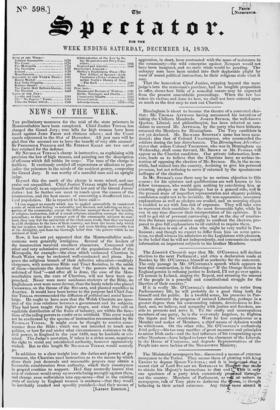NEWS OF TUE WEEK.
THE preliminary measures for the trial of the state prisoners in Monmouthshire have been completed. Chief Justice TINDAL has charged the Grand Jury ; true bills for high treason have been
found against JOHN FROST and thirteen others ; and the Court stands adjourned to the 31st of December. All just men will be glad that the accused are to have the benefit of very able counsel : Sir FREDERICK POLLOCK and Mr. FITZROY KELLY are two out of four retained for the defence.
Sir NICHOLAS TimnAn's charge is instructive, as explaining with precision the law of high treason, and pointing out the description of offences which fall within its scope. The tone of the charge is faultless. It cautiously avoided all expressions or allusions to pre- judice the prisoners in the minds of the resident gentry, composing the Grand Jury. It was worthy of a merciful man and an upright judge. Beyond this the merit of the charge is more mixed, and our praise not unqualified. Chief Justice TINDAL might have confined
himself strictly to an exposition of the law and of the Grand Jurors' duties : but he further saw meet to touch upon the causes of the insurrection, and the best means of converting a disaffected iuto a
loyal population. He is reported to have said-
" I can suggest no remedy which can be applied successfully to counteract a state of mind and feeling so unhealthy and diseased, and infecting so large a portion of the community, except the diffusion amongst them of the benefits of religious instruction, and of a sound religious education amongst the rising generation; so that as the younger part of the community advance to man- hood, they may feel the conviction ot the wholesome truth, that they are bound to yield obedience to the laws of their country, not from the terror only which the law inspires, but from a much higher and more binding motive—the fear of the Almighty, and from the thorough belief that the powers which be are ordained of God.'" Now, it has not yet appeared that the Monmouthshire male- contents were generally irreligious. Several of the leaders of the insurrection received excellent characters. Compared with other and very submissive portions of the population—that of the Metropolis, for example—the class which embraced Chartism in South Wales may be reckoned well-conducted and pious. Im- prove the religious branch of their defective education—multiply clergymen, with numerous Bible and Tract Societies, in the midst of them—inculcate the doctrine that "the powers which be are ordained of God "—and after all is done, the case of the Mon- mouthshire men, the cure of Chartism, will not have been ap- proached. Never were more assiduous students of the Bible, no Englishmen ever were more devout, than the hardy rebels who placed CROMWELL on the throne of the STUARTS, and planted republics in America. It would have been better to the purpose had Chief Jus- tice TINDAL recommended the -diffusion of political and social know- ledge. He ought to have seen that the Welsh Chartists are igno- rant of the true relations between a government and its subjects. They had been taught that higher wages, and what they call an equitable distribution of the fruits of industry, are within the func- tions of the ruling powers to confer or to withhold. This error would not be eradicated by the species of instruction recommended by Sir NICHOLAS TINDAL. It might even be thought to receive coun- tenance from the Bible ; which was not intended to teach men politics, or how far and under what circumstances resistance to the civil power, in England in the year 1839, may be laudable or cri- minal. The Judge's quotation, if taken in a strict sense, negatives the right to resist any established authority, however oppressively wicked. But to this length Sir NICHOLAS TINDAL would scarcely go. In addition to a clear insight into the duties and powers of go- vernment, the Chartists need instruction as to the means by which alone their just demands and reasonable prayers may obtain a flivourable consideration from authority, which their countrymen in general combine to support. Had they assuredly known that acts of violence would array an overwhelming strength against them, and change even wellwishers into opponents—that in the existing state of society in England treason is madness—that they would be inevitably crushed and speedily punished—had their means of
aggression, in short, been contrasted with the mass of resistance in the community—the wild enterprise against Newport would not have been imagined, and no state trials would be pending. The unhappy men have been misled into their deplorable plight by want of sound political instruction, be their religious state what it may.
That the benevolent Chief Justice, stepping beyond the mere judge's into the statesman's province, had no tangible proposition to offer, shows how little of a remedial nature may be expected from the present unavoidable proceedings. When the law has taken its victims and done its best, we shall not have entered upon so much as the first step to root out Chartism.


























